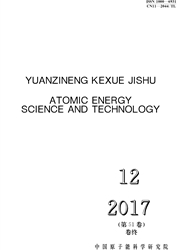

 中文摘要:
中文摘要:
在现有的冷源设计中,两相氢循环因其换热能力强而被广泛采用,但它最大的缺点是存在含气率影响慢化的稳定性。能否采用单相循环代替两相循环实现高热流密度的热量输出,是待研究的重点。为兼顾循环流量等宏观特性和流场、温度场分布等细节参数的分析,提出了一种基于迭代的耦合算法,将一维理论公式与三维数值仿真模型相结合,用于分析中国先进研究堆单相冷包方案的可行性。研究发现,单相循环只能带走约30%的核发热,但由于冷包增加了氦冷却套,其余热量全部通过氦气对冷包壁面的直接冷却带走。温度场的分析显示液氢和壁面的最高温度分别为21.7和23.7K。这说明冷包得到了充分冷却,单相循环及单相冷包结构可满足工程需要。
 英文摘要:
英文摘要:
In existing schemes of cold neutron sources, two-phase thermo-siphon loop is widely adopted for its high heat exchange performance. However, the void fraction in moderator may affect the stability of moderation. In this paper, the single-phase thermo-siphon loop was studied in its performance of dealing with high heat flux in order to replace the two-phase one. A couple method based on iteration, which combines the one-dimensional theoretical formula and three-dimensional numerical simulation, was presented to analyze the feasibility of single-phase moderator cell scheme in CARR cold neutron source. Both macro-performance of the loop and the detailed information such as flow and temperature field inside moderator cell can be analyzed by this method. Theresults show that the thermo-siphon loop only takes away about 30%o of the total heat release. However, with the addition of helium cooling jacket, the rest of heat can be removed by the direct heat transfer between the metal walls and helium gas. The temperature field shows maximum temperatures of liquid hydrogen and walls are 21.7 K and 23.7 K, respectively. The above results indicate that the moderator cell can be cooled adequately, which proves the single-phase thermo-siphon with helium direct cooling as well as the corresponding moderator cell scheme can meet the requirement of CARR project.
 同期刊论文项目
同期刊论文项目
 同项目期刊论文
同项目期刊论文
 期刊信息
期刊信息
